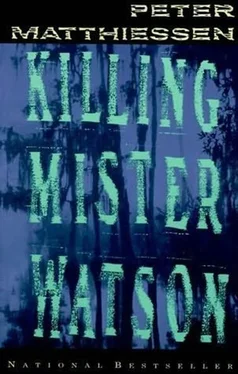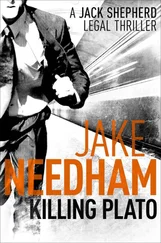Peter Matthiessen - Killing Mister Watson
Здесь есть возможность читать онлайн «Peter Matthiessen - Killing Mister Watson» весь текст электронной книги совершенно бесплатно (целиком полную версию без сокращений). В некоторых случаях можно слушать аудио, скачать через торрент в формате fb2 и присутствует краткое содержание. Жанр: Современная проза, на английском языке. Описание произведения, (предисловие) а так же отзывы посетителей доступны на портале библиотеки ЛибКат.
- Название:Killing Mister Watson
- Автор:
- Жанр:
- Год:неизвестен
- ISBN:нет данных
- Рейтинг книги:4 / 5. Голосов: 1
-
Избранное:Добавить в избранное
- Отзывы:
-
Ваша оценка:
- 80
- 1
- 2
- 3
- 4
- 5
Killing Mister Watson: краткое содержание, описание и аннотация
Предлагаем к чтению аннотацию, описание, краткое содержание или предисловие (зависит от того, что написал сам автор книги «Killing Mister Watson»). Если вы не нашли необходимую информацию о книге — напишите в комментариях, мы постараемся отыскать её.
Killing Mister Watson — читать онлайн бесплатно полную книгу (весь текст) целиком
Ниже представлен текст книги, разбитый по страницам. Система сохранения места последней прочитанной страницы, позволяет с удобством читать онлайн бесплатно книгу «Killing Mister Watson», без необходимости каждый раз заново искать на чём Вы остановились. Поставьте закладку, и сможете в любой момент перейти на страницу, на которой закончили чтение.
Интервал:
Закладка:
BILL HOUSE
Watson had went home again to Columbia County, where he took him to wed a Baptist preacher's daughter. I sure liked the little that I seen of her. My sister Mamie knew her good, said Edna Watson was a very fine young woman. Folks hoped she'd calm Ed down a little, although he was the calmest man to meet you ever saw. But Watson went back to his farm up north, this was long about 19 and 07, and got himself into a scrape with his own kin. They tried him for murder but some way he got clear of it, and come back south after nine months in prison. Said he was home again for good, and damn glad of it. Probably he told 'em the same thing in Columbia County back in 1901 when he showed up there again after fourteen years.
The men was scared of Watson now, including the ones who told him Welcome home! And Watson knowed people was leery of him though he pretended not to notice. No one messed with him. They kept on pretending everything would be all right so long as they stayed on the good side of ol' Ed, who never been nothing but friendly to his neighbors.
In the old days, Watson hid his past and was touchy about people telling tales, but he had learned how he could use all the attention come his way for knowing them famous outlaws in the Territories, he made the most of all them bad-man stories. Didn't encourage but never quite denied them. Knowing how few had the guts to ask him for the truth, he only smiled. Mostly he thought it was a pretty good joke, or that's what he told Henry Thompson. His reputation as a fast gun and willing to use it was what kept deputies off the Bend and helped him stake claims on abandoned mounds, which was pretty near all that was left down on the rivers.
One day at Everglade, Watson come in to Storter's for his mail, took some coffee and tobacco in trade for a crate of syrup. Watson was first to put up syrup in them screw-top gallon cans, six to a crate. I had some rum in me that day and was feeling cocky-grinning, you know, teasing him a little, the way Tant Jenkins done. I got along with Watson well enough. There was some other men around, and I guess I figured he'd hate to shoot us all, so I asked him how come such a good farmer was always getting into so much trouble.
Another day Ed might have grinned, you never knew how anything was going to strike him. But this day the eyes under that hat faded out to a pale smoky blue, like that dead blue scale on a snake's eye when it is shedding. He didn't speak for a long time, just looked me over, trying to see behind my question. Them eyes hunted out each man there in the store, one at a time, see if anyone else had something smart to say. You could of heard a little tree toad sip the air. Weren't a man in the place would of claimed acquaintance with Bill House, not if I'd went up to him, paid out ten dollars.
Storter's black hound was laying in the sunshaft in the door. That there was the lovinest dog, always picked the place she was most underfoot, just so you touched her. Damn if that bitch don't sidle out the door, tail hunkered under, like she'd been caught making off with the church supper. When Watson's eyes come round to me again, my ol' tail was tucking under, too, that's how much I wished that ol' black hound had took me with her.
I knowed that day how a treed panther feels, snarling and spitting at them hounds, and the hunter coming, taking his sweet time, walking in across the clearing. That's when you yell and jump, do something stupid, just to end that tightness.
Watson held my eye for quite a while there, wouldn't let me go. He never blinked. I was blinking, all right, but I stayed right with him, that grin stuck on my teeth. I grinned right into them blue eyes like a damn mule.
"When trouble comes hunting me, boy, I take care of it." And he looked all around again, just to make sure that no man there had missed that message.
My sister Mamie recollects how he said this to her, but it was me.
An interesting source of background material for Chokoloskee Bay is the writing of Mr. C.G. McKinney in The American Eagle. Mr. McKinney, storekeeper and pundit, contributed the Chokoloskee column (usually signed "Progress"), which he commenced in 1906, not long after Ted Smallwood took over as postmaster.
On June 3 of 1909, the week Count Zeppelin's airship was disabled by a tree-the week in which, in burgeoning Fort Myers, "electric lights have been placed along Riverside Avenue as far as Mr. Edison's residence, and the rush of automobiles and the tooting of their melodious horns make the night hours lively"-McKinney reported that Chokoloskee "had a lot of drunken Indians with us this week… Mr. D.D. House is on his farm, hoeing out his cane…"
The following week, as a national "Committee of 40" announced plans to raise five million dollars for "the uplift of the Negro," two Negroes were "strung up" at Arcadia. The lynchings evoked editorial cautions against crazing Negroes with cocaine to get more work out of them. At Fort Myers (where the price of eggs had risen to 25 cents a dozen) the "craze" was baseball. At Chokoloskee, Mr. D.D. House, whose doings were ever prominent in his friend's column, was preparing to plant tomatoes, alligator pears (avocados), and corn. Louie Bradley and parents were visiting from Flamingo, Andrew Wiggins was moving to the Lost Man's region, and Mr. Waller came in from McKinney's farm at Needhelp reporting forty rotting carcasses of deer skinned out by Indians for the buckskin trade.
In early July, "Mr. House the cane man was up on Half Way Creek looking at Mr. Wm. Wiggins and Dr. Green's fine cane." William Wiggins was being visited by Gene Roberts and family from Flamingo, who were soon to acquire his son Andrew's house on Chokoloskee. Waller was down again from Needhelp, where he was growing melons, beans, and corn, and Bill and young Dan House had gone off "prospecting" to British Honduras. Caxambas reported the return from "Sheviler Bay" of Mr. J.E. Cannon, who was farming these days on Chevelier's old place at Possum Key.
In mid-August, Mr. Waller was preparing for a "gator hunt," and the island's erstwhile preacher, Brother Slaymaker, "has invested in the bicycle business." McKinney also reported that "Mr. E.J. Watson was with us this week."
In early September, Waller reported that Miss Hannah Smith, now in residence at Needhelp, was "ailing." McKinney, observed, "We had some drunken folk on the Island last week. We think it was drinking brackish water that caused their troubles." In his twenty-three years at Chokoloskee, he had never seen sandflies so bad or guavas so plentiful.
On September 23rd, it was reported that the House boys, gator hunting in Honduras, were doing fairly well, and that George Storter was "logging heavily" up Turner River. "Mr. E.J. Watson and family have been with us this week."
In early October, tomatoes were blooming. D.D. House was bound for Key West with a cargo of cane, while Gene Roberts was going back and forth from Chokoloskee to his cane-fields at Flamingo. At Fort Myers, dispute over cattle in the streets was raging, and meanwhile Captain Cole had left for New York to buy a passengers-and-freight steamer for service between Punta Rassa and Key West. Weather on the coast was dark and ugly, despite little rain.
On October 12, the coast was struck by the "West Indian Hurricane," with winds up to 120 mph, which did such damage at Key West that the city was put under martial law to deter looters. Ninety-five vessels were driven out to sea, ashore, or sunk; nine cigar factories were utterly destroyed; the roof was removed from the First National Bank. Among those who lost their boats was Mr. D.D. House, who had discharged his cargo, loaded up provisions, and set out on his return before the storm drove him back into Key West, where he lost everything.
Читать дальшеИнтервал:
Закладка:
Похожие книги на «Killing Mister Watson»
Представляем Вашему вниманию похожие книги на «Killing Mister Watson» списком для выбора. Мы отобрали схожую по названию и смыслу литературу в надежде предоставить читателям больше вариантов отыскать новые, интересные, ещё непрочитанные произведения.
Обсуждение, отзывы о книге «Killing Mister Watson» и просто собственные мнения читателей. Оставьте ваши комментарии, напишите, что Вы думаете о произведении, его смысле или главных героях. Укажите что конкретно понравилось, а что нет, и почему Вы так считаете.












